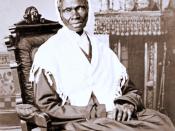Feminism in America in the 1970's was driven by various female organisations committed to the equality of both men and women. Our Bodies, Ourselves written by numerous women from The Boston Women's Health Book Collective seeks to gain personal equality in the lives of every female. Our Bodies, Ourselves plays a significant role in the post-war feminists fight against sexism in America. The central theme throughout the book is the disempowerment of women, in all aspects of their life including the home, workplace and to even their own bodies. In comparison to other post-war feminist works, Our Bodies, Ourselves sees a shift from liberating women politically, such as equal rights and equal pay, to a focus on liberating them in their current environment. There is a strong focus on the education of women in order to empower them in their homes, families, workplaces and relationships.
Post-war feminists typically shared the belief that women had a lack of control over their bodies.
It was also a concern that women had very little or no understanding of their bodies or sexuality, as Estelle B. Freedman noted, "As women shared stories of bodily pleasures and pain, they admitted ignorance about sexuality and reproduction". The idea of empowering women through the control of their bodies was common amongst post-war feminists, as stated by Margaret Sanger , "no woman can call herself free who does not control her body". Therefore, it was this in mind that Our Bodies, Ourselves was written in order to empower women on a grassroots level.
Unlike other books by post war feminist, Our Bodies, Ourselves, provides avenues and opportunities for women to empower themselves. Ruth Rosen's book, The World Split Open , discusses a significant feminist book of the time, The Feminine Mystique , and criticises it for not sufficiently...


